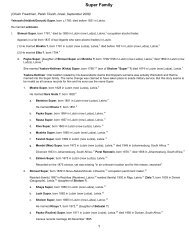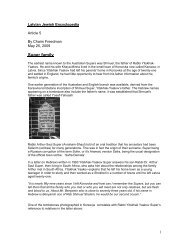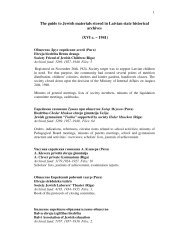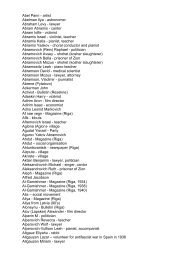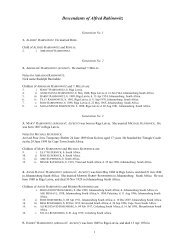Small Riga Ghetto
Small Riga Ghetto
Small Riga Ghetto
You also want an ePaper? Increase the reach of your titles
YUMPU automatically turns print PDFs into web optimized ePapers that Google loves.
118<br />
the police station in Mazā Kalna Street. There, a stack of boards was moved<br />
aside and once again people searched for something. Finally the group went<br />
through a courtyard on Viļānu Street toward Lauvas Street. Here in a ruined<br />
building they found an excellently camouflaged hiding place where mattresses,<br />
distilled water, candles, petroleum, biscuits, canned food and other things had<br />
been stored. Besides, various valuables were also found bricked up into the<br />
walls.<br />
Later the German Jewish police chief Perl discovered still more valuable objects<br />
in the same place and kept them for himself.<br />
Israelowitsch was taken back to the prison. For a long time we heard nothing<br />
more about him. The whole weapons incident seemed to have petered out.<br />
The former policeman Goldberg (from the women's ghetto) was also brought<br />
out of prison and people once again dug in places that he pointed out. Apparently<br />
this enterprise too was connected with the weapons incident.<br />
At this time the Kommandant paid a visit to Lielā Kalna Street. It turned out<br />
that as soon as he came into view four young people fled from one of the<br />
houses and disappeared. The Kommandant, who had seen this, ordered the police<br />
to bring these four persons to him at any cost and set a certain deadline.<br />
He guaranteed the fugitives their freedom. The young men presented themselves<br />
and were in fact released. But a short time later they were separately<br />
arrested and taken away. They were never seen again in the ghetto. Among<br />
them was a fourteen-year-old boy named Dolgitzer. After a few months a series<br />
of arrests of the resistance movement's members began.<br />
The work crews returning to the ghetto were waited for at the gate and individuals<br />
were selected out of them.<br />
It turned out that a list had existed on which only family names had been<br />
noted. For this reason, all of the members of a given family were always taken<br />
out of the work crews.<br />
On one of these occasions a certain Boris Freidberg was also arrested, but he<br />
managed to flee. Thereupon the ghetto was placed under a state of emergency.<br />
Under these circumstances the men's access to the Latvian women's ghetto and<br />
to the German ghetto was barred. These measures were also connected with<br />
the weapons incident.<br />
The next morning a printed announcement of the Kommandant was posted<br />
on the streets. It bore a signature and read as follows:<br />
"It is necessary to interrogate the Jew Boris Freidberg from the Latvian<br />
ghetto concerning a certain matter. But he is in hiding. If he voluntarily<br />
presents himself by 20 hours tomorrow evening, nothing will happen to



